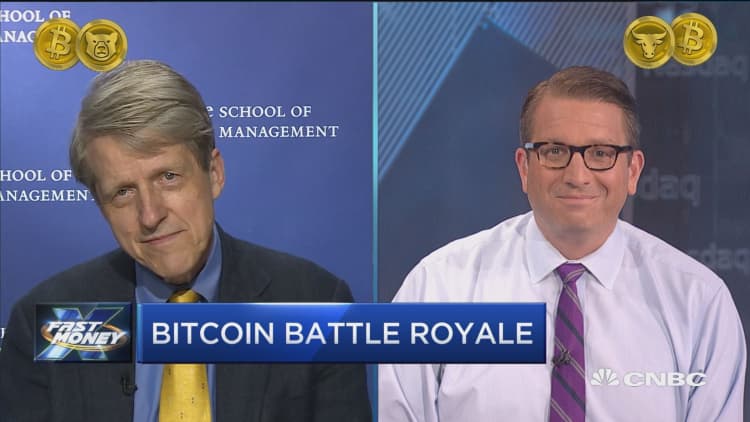
With popular cryptocurrency a few percentage points away from a new high, Yale economics professor Robert Shiller shared his theory on why it resembles a bubble.
Shiller, who won the Nobel Prize in Economics for his work on bubbles, told CNBC's "Fast Money" on Wednesday that often bubbles are promulgated by stories, not metrics.
"I'm not as negative as it may seem, but I think that the thing that's driving bitcoin at the moment, like other examples of bubbles, is a story," Shiller said. "And it's the quality of the story that's attracting all this interest, and it's not necessarily sustainable."
Bitcoin's increasingly attractive story all started with its mysterious creator, Satoshi Nakamoto, whose existence is hotly debated after he created the currency then disappeared, Shiller said.
"Then, we have a new form of money that ... sounds extremely revolutionary and involves a very clever use of cryptography that you can spend all afternoon trying to figure out," Shiller said. "So the story has inspired young people and active people, and that's what's driving the market. It's not fundamentals. It's not like this is a fundamentally important thing, this bitcoin."
Still, Shiller did not find the word "bubble" perfect for describing bitcoin. It suggests that when a bubble bursts, it vanishes, which is not what happens with most financial bubbles, he said.
"I don't mean to say that we're going to see a burst in bitcoin tomorrow and it will be gone forever. We did see a burst in 2013, by the way. It could happen again, and then it could take off again," the professor said.
Shiller added that he is not demeaning the innovation and technology behind the peer-to-peer cryptocurrency's system. But he did harbor some hesitation when it comes to bitcoin's uses.
"It seems to me that the enthusiasm for bitcoin is a little bit out of proportion to its immediate application," Shiller said. "I don't know, maybe it's possible that you can still ride this bubble on bitcoin. But I keep thinking there'll be other currencies, other ideas [that] will come up and will eclipse this one. So it's risky."


